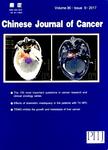Will Chinese ovarian cancer patients benefit from knowing the BRCA2 mutation status?
Will Chinese ovarian cancer patients benefit from knowing the BRCA2 mutation status?作者机构:Department of PathologyThe University of Texas MD Anderson Cancer CenterHoustonTX 77030USA Department of Gynecology and ObstetricsTianjin Medical University General HospitalTianjin 300052P.R.China.
出 版 物:《Chinese Journal of Cancer》 (Chinese Journal of Cancer)
年 卷 期:2012年第31卷第1期
页 面:1-4页
核心收录:
学科分类:0710[理学-生物学] 07[理学] 09[农学] 071007[理学-遗传学] 0901[农学-作物学] 090102[农学-作物遗传育种]
主 题:BRCA2 基因突变 卵巢癌 中国 状态 患者 BRCA1 西方国家
摘 要:In Western countries, the mutation status of the BRCA1 and BRCA2 genes is commonly determined for genetic counseling among members of families with a history of breast or ovarian cancer, especially for women of the Ashkenazi Jewish ethnicity. Recent studies in the Cancer Genome Atlas project have demonstrated that BRCA2 mutation carriers are more responsive to platinum-based chemotherapy among high-grade serous ovarian cancer patients. Thus, in Western countries, the mutation status of BRCA1 and BRCA2 is recognized to have an important value with which to assess cancer risk and therapeutic response. However, very limited studies of BRCA1 and BRCA2 mutations and their implications for counseling and therapeutic prediction have been conducted in China. Therefore, a potentially important genetic test that is technically simple has not benefited Chinese women with an increased risk of breast or ovarian cancer. This article summarizes the current progress in the study of BRCA1/2 mutation in China and recommends an increased effort in applying advances in genetic testing to the clinical management of Chinese patients with ovarian cancer.



